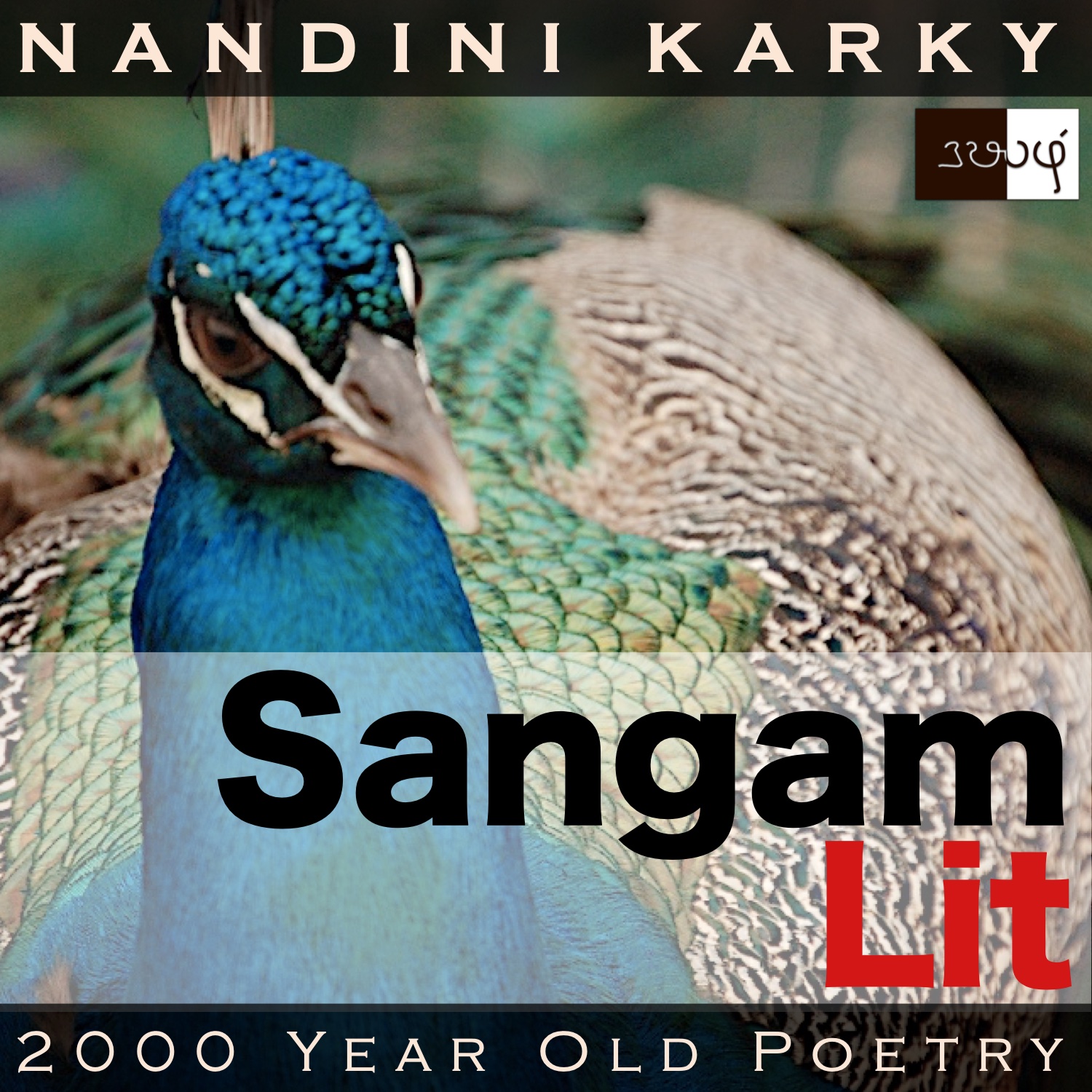Podcast: Play in new window | Download
Subscribe: Apple Podcasts | Spotify | Amazon Music | Android | iHeartRadio | TuneIn | RSS | More

In this episode, we relish picturesque scenes from a mountain country, as portrayed in Sangam Literary work, Natrinai 396, penned by an anonymous poet. The verse is situated in the hills of ‘Kurinji’ and speaks in the voice of the confidante to the man, persuading him to seek the lady’s hand, without further delay.
பெய்து போகு எழிலி வைகு மலை சேர,
தேன் தூங்கு உயர் வரை அருவி ஆர்ப்ப,
வேங்கை தந்த வெற்பு அணி நல் நாள்,
பொன்னின் அன்ன பூஞ் சினை துழைஇ,
கமழ் தாது ஆடிய கவின் பெறு தோகை
பாசறை மீமிசைக் கணம் கொள்பு, ஞாயிற்று
உறு கதிர் இள வெயில் உண்ணும் நாடன்!
நின் மார்பு அணங்கிய செல்லல் அரு நோய்
யார்க்கு நொந்து உரைக்கோ யானே-பல் நாள்
காமர் நனி சொல் சொல்லி,
ஏமம் என்று அருளாய், நீ மயங்கினையே?
Opening with the words ‘பெய்து போகு எழிலி’ meaning ‘a cloud that has poured’, the verse captures a cloud at a satisfied moment, when it has completed its task of showering moisture to the earth beneath. As many a cloud-capped peak would attest, the ‘residing abode in the mountains’ of these clouds is mentioned in ‘வைகு மலை’. The sights and sounds of this mountain is illustrated in ‘தேன் தூங்கு’ meaning ‘hanging honeycombs’ and ‘அருவி ஆர்ப்ப’ meaning ‘resounding cascades’. The quintessential tree of the mountains smiles at us in ‘வேங்கை’ or ‘Indian Kino tree’ and ‘பொன்னின் அன்ன பூஞ் சினை’ referring to ‘its flower dust, akin to gold’. Curiously here, the word ‘தோகை’, which means ‘feathers’ in current-day lingo, talks about a ‘beautiful peacock’ in the words ‘கவின் பெறு தோகை’. This could be an expression in line with the Sangam poetic custom of symbolising a person as their body part, which we have seen in many other Natrinai poems. ‘இள வெயில்’ makes one sense the gentle and soothing ‘rays of morning sunshine’. The phrase ‘யார்க்கு நொந்து உரைக்கோ’ meaning ‘to whom shall I lament’ reminds one of this poignant thought reflected in many modern lyrics. ‘Many words filled with affection’ can be seen in ‘காமர் நனி சொல்’. The verse ends with ‘நீ மயங்கினையே’, which means ‘you are confused’, and makes us explore to know more!
The man and lady had been leading a love relationship and the man seemed to be intent only on trysting with the lady. One day, when he arrives to meet with the lady, the confidante says to him, “The rain cloud that is done pouring reaches its resting spot in the mountains; Tall hills with hanging honeycombs resound with the sound of cascades; On an auspicious day, decorating the mountains, the ‘vengai’ showers gold-like, fragrant pollen, which coats the exquisite huge feathers of a peacock, which then moves atop a green-hued boulder, and along with its kith and kin, savours the gentle rays of the morning sun. Such is your land, O lord! To whom, can we lament about the impossible affliction that arose owing to the embrace of your chest? Many days, you have been speaking pleasant words of affection, and yet, you do not grant your grace. Indeed, you are in a muddled state!” With these words, the confidante expresses her frustration at the inaction of the man and nudges him to move away from temporary pleasures to the permanent path of happiness.
Time to delve into the details! The confidante starts with an image of a pregnant cloud that has just delivered its offspring of rain on the land. Then, this cloud saunters in a carefree manner to its resting spot around the hills. From the cloud, the confidante turns her lens on the said resting spot and points to how numerous honeycombs hang in the clefts of these hills. A sight, menacing when you think of a bee bite, and yet, tantalising when you think of savouring honey! Pausing in silence, the roar of the mountains is illustrated in the sound of the flowing waterfalls. In such a setting, the ‘vengai’ tree has burst forth its flowers and the gold dust of pollen seems to adorn that rugged mountain land. A passing peacock finds itself coated in this pollen and decides to relish the warmth of the morning sunshine along with its relatives on a green-hued boulder. The entire scene has been narrated to describe the man’s mountains but, more may hide within, which we shall unravel soon!
Now, the confidante turns her attention to the pitiable state of her friend, caught in a love affliction that arose from embracing the man’s chest. And, she wonders aloud to whom to express the pain in that state when the man keeps speaking fine words to the lady but does little to grace her with a lasting happiness. Concluding that the man is not seeing the truth with clear eyes, the confidante calls him ‘confused’! In the scene of the peacock being showered with gold-like pollen and basking in the warmth of the sun, the confidante places a metaphor for how the man must shower the lady’s kin with wealth and claim the lady’s hand so as to take her to his hamlet and bask in the sunshine of a happy, married life, surrounded by the affection of his kith and kin. What I see as the punchline of the verse is when the confidante mentions how the man has been speaking fine words, that too, filled with love, but nothing really to show for it. The confidante seems to sound a clarion call for the man to put aside his elegant but empty words and become a man of action!




Share your thoughts...